
Second day of voting in chaotic Uganda election: image via AFP news agency @AFP, 19 February 2016

A police officer sprays tear gas on a protester apprehended on Day 2 of Uganda's elections @AFP @AFPphoto: image via AFPAfrica news agency @AFPAfrica, 19 February 2016
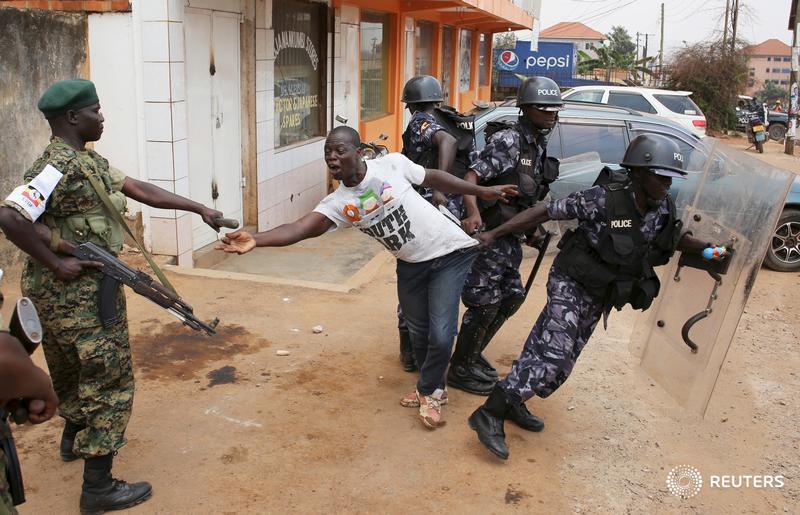
Ugandan police clash with opposition protesters a day after the presidential election: image via Reuters Pictures @reuterspictures, 19 February 2016
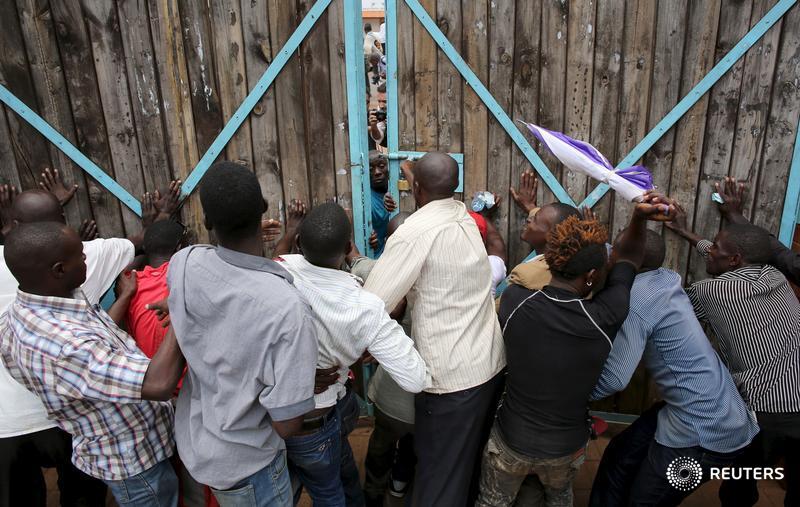
Ugandan police clash with opposition protesters a day after the presidential election: image via Reuters Pictures @reuterspictures, 19 February 2016
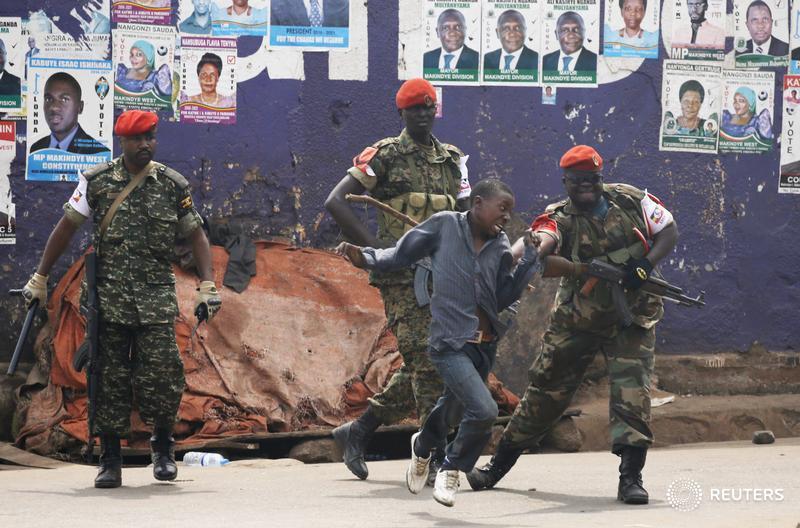
Ugandan police clash with opposition protesters a day after the presidential election: image via Reuters Pictures @reuterspictures, 19 February 2016
Joseph Ceravolo: where is the guide, O Hermes

Ugandans start casting votes on Thursday to decide
whether to give Yoweri Museveni, in power for three decades, another
term in office: photo by Ben Curtis/AP, 18 February 2016

Ugandans start casting votes on Thursday to decide
whether to give Yoweri Museveni, in power for three decades, another
term in office: photo by Ben Curtis/AP, 18 February 2016
Joseph Ceravolo: where is the guide, O Hermes
....,,March 31, 1988
A man listens to music next to me, and
a woman next to him listens
to music, and a woman reads next to her.
Two men talk, one a white boy
the other a black white bearded man
a woman next to him listens
to music, and a woman reads next to her.
Two men talk, one a white boy
the other a black white bearded man
describing the stops along the tracks.
Sweet descriptions and voices
Sweet descriptions and voices
of holy mankind, holy rites
along the route to Troy.
But where is the warrior and where
is the guide, O Hermes
in the drafty Spring moonlight
where wind shakes apart tears
that soldiers keep to themselves
even in the music of the trees that set
them free along the holy ring of stars
in the destruction of the world
Joseph Ceravolo (1934-1988): Untitled (March 31, 1988), from Collected Poems, 2013
A Ugandan soldier stands guard in front of posters for opposition
leader Kizza Besigye and other candidates in the parliamentary elections: photo by Ben Curtis/AP, 19 February 2016
Ugandan Forces Use Strong-Arm Tactics Amid Presidential Vote: The Associated Press, 10 February 2016
KAMPALA,
Uganda — Ugandan President Yoweri Museveni's security forces used
strong-arm tactics in the middle of an election Friday, arresting the
main opposition candidate, beating protesters and firing tear gas and
stun grenades at them in the capital.
The
United States, which gives financial support to this East African
nation and helps train its military, was among those condemning the
brutal actions. It occurred as voting from Thursday's election continued
in two main districts Friday because ballots and other election
materials had not arrived on election day.
Early
returns Friday put Museveni ahead of opposition leader Kizza Besigye,
but votes remained to be cast and counted in Besigye strongholds.
With
results from about 47 percent of polling stations across the country
counted, Museveni had about 63 percent of the vote and Besigye had about
33 percent, the election commission said late Friday. Final results are
expected on Saturday.
Police
surrounded the headquarters of Besigye's Forum for Democratic Change
party as he was meeting with party members, and a helicopter fired tear
gas at a crowd outside.
Then police moved in and took Besigye, a
59-year-old doctor, to an unknown location, according to Semujju Nganda,
a spokesman for the FDC.
Police
spokesman Fred Enanga said Besigye was transferred for his own safety
and because police wanted to talk to him "to exercise restraint until
the final results are announced." Besigye was driven to his home and his
movements are not restricted, he said.
U.S.
Secretary of State John Kerry spoke over the phone Friday with Museveni
"to underscore that Uganda's progress depends on adherence to
democratic principles in the ongoing election process," the U.S. State
Department said.
Kerry
"expressed his concern about the detentions of ... Besigye and
harassment of opposition party members during voting and tallying and
urged President Museveni to rein in the police and security forces."
The U.S. Embassy said on Twitter that "We strongly condemn the disproportionate police action taken today at FDC HQ in Kampala."
After
Besigye's arrest, his supporters took to the streets. Riot police
lobbed tear gas and stun grenades at them and fired warning shots from
automatic rifles, then chased them through narrow alleyways, arresting
some. Armored personnel carriers rumbled up and down the main street in
Kampala. A woman and her children fled on a motorbike.
In
nearby poor neighborhoods, people set up burning barricades, which riot
police and military police quickly took down. Angry protesters also
erected barricades of stones on the highway leading to Uganda's
international airport. Police fired tear gas and whacked protesters with
sticks.
Muthoni
Wanyeki, Amnesty International's regional director, noted that the raid
represented a "restriction on the rights to freedom of association and
peaceful assembly. The security forces must act with restraint."
The
spokesman for the U.N. secretary-general, Stephane Dujarric, said Ban
Ki-moon was concerned over the reports of "detentions and violence" and
trusts that "the authorities and all stakeholders will ensure that the
fundamental rights and the will of the people of Uganda be respected."
Police
parked trucks near the home of presidential candidate Amama Mbabazi, a
former prime minister. Josephine Mayanja-Nkangi, a spokeswoman for
Mbabazi, said he interpreted the deployment to mean he cannot leave his
house.
The
voting Thursday suffered delays in delivery of voting materials,
especially in areas seen as opposition strongholds. Voting was taking
place Friday at 36 polling stations in Kampala and the neighboring
district of Wakiso.
The
government had shut down social media sites such as Twitter and
Facebook but many Ugandans were circumventing that by using virtual
private networks, or VPNs.
Besigye
was also briefly arrested late Thursday after visiting a house in
Kampala where he suspected ballot-stuffing was taking place. Police said
the house was a security facility and accused Besigye of trespassing on
government property.
Museveni,
71, took power in 1986 and pulled Uganda out of years of chaos after a
guerrilla war. He is a key U.S. ally on security matters, especially in
Somalia. His critics worry he may want to rule for life, and accuse him
of using security forces to intimidate and harass the opposition.
Besigye,
59, was Museveni's personal physician during a war and served as deputy
interior minister in Museveni's first Cabinet. He broke with the
president in 1999.
"The
military is now all over the place. It's a show of force. They are
saying, 'We are ready to kill you if you protest,'" said Mwambutsya
Ndebesa, a professor of history at Uganda's Makerere University.
"Museveni has overstretched the goodwill Ugandans gave him. It is going
to be very bad for him in terms of legitimacy."

Pedestrians walk past campaign posters for long-time President Yoweri Museveni, as well as for local members of Parliament, on a street in Kampala: photo by Ben Curtis/AP, 18 February 2016

Pedestrians walk past campaign posters for long-time
President Yoweri Museveni, as well as for local members of Parliament,
on a street in Kampala: photo by Ben Curtis/AP, 18 February 2016

A ballot box is seen in a polling station just before people start voting during elections in Kaabong in Karamoja region, Uganda: photo by Goran Tomasevic/Reuters, 18 February 2016

People queue to cast their ballots in a polling station during elections in Kirihura in western Uganda: photo by James Akena/Reuters, 18 February 2016
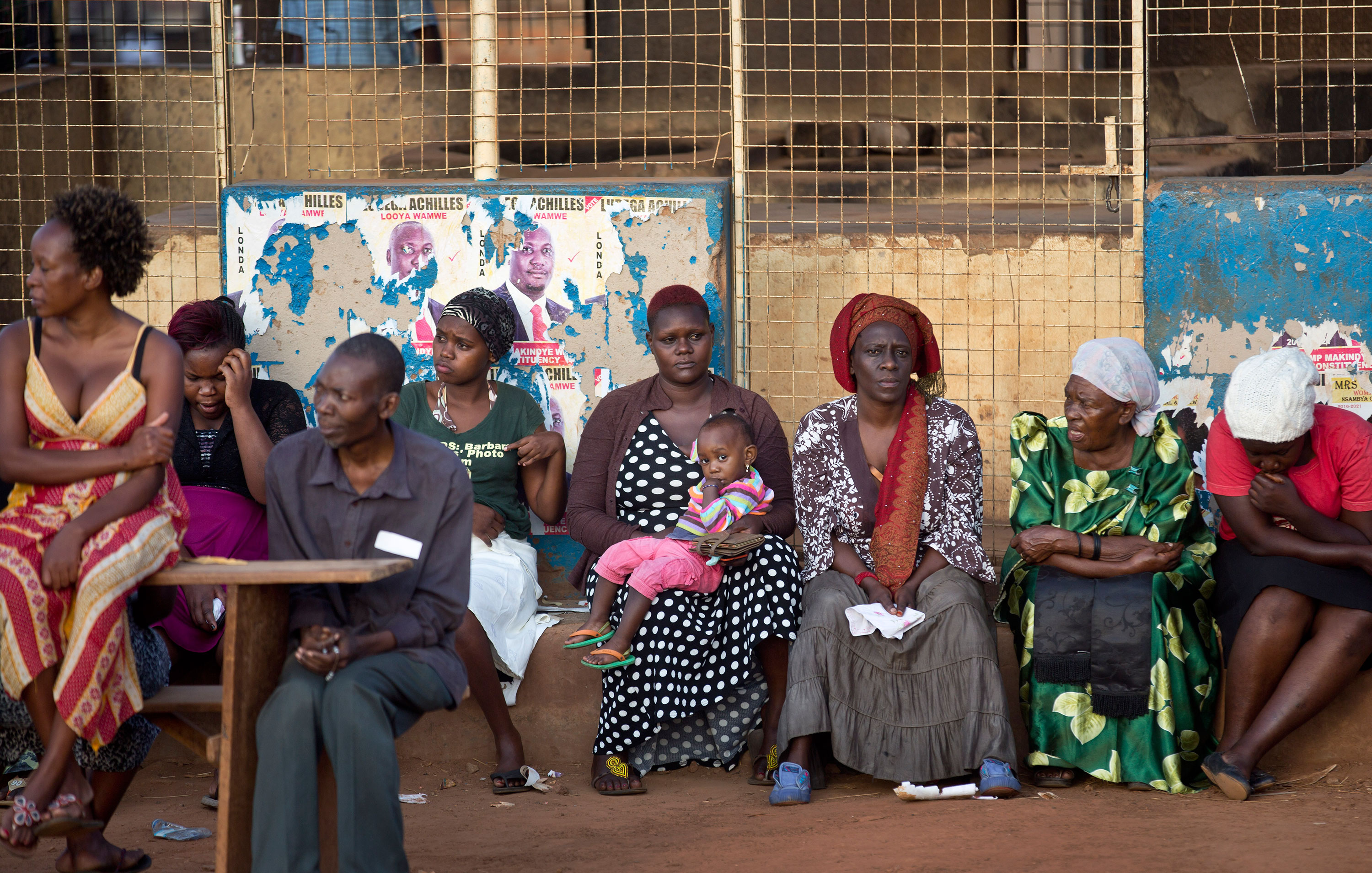

Ugandans went to the polls on Thursday as President
Yoweri Museveni, in power for 30 years, is facing his tightest race ever
with opposition leader Kizza Besigye his main challenger: photo by Ben Curtis/AP, 18 February 2016
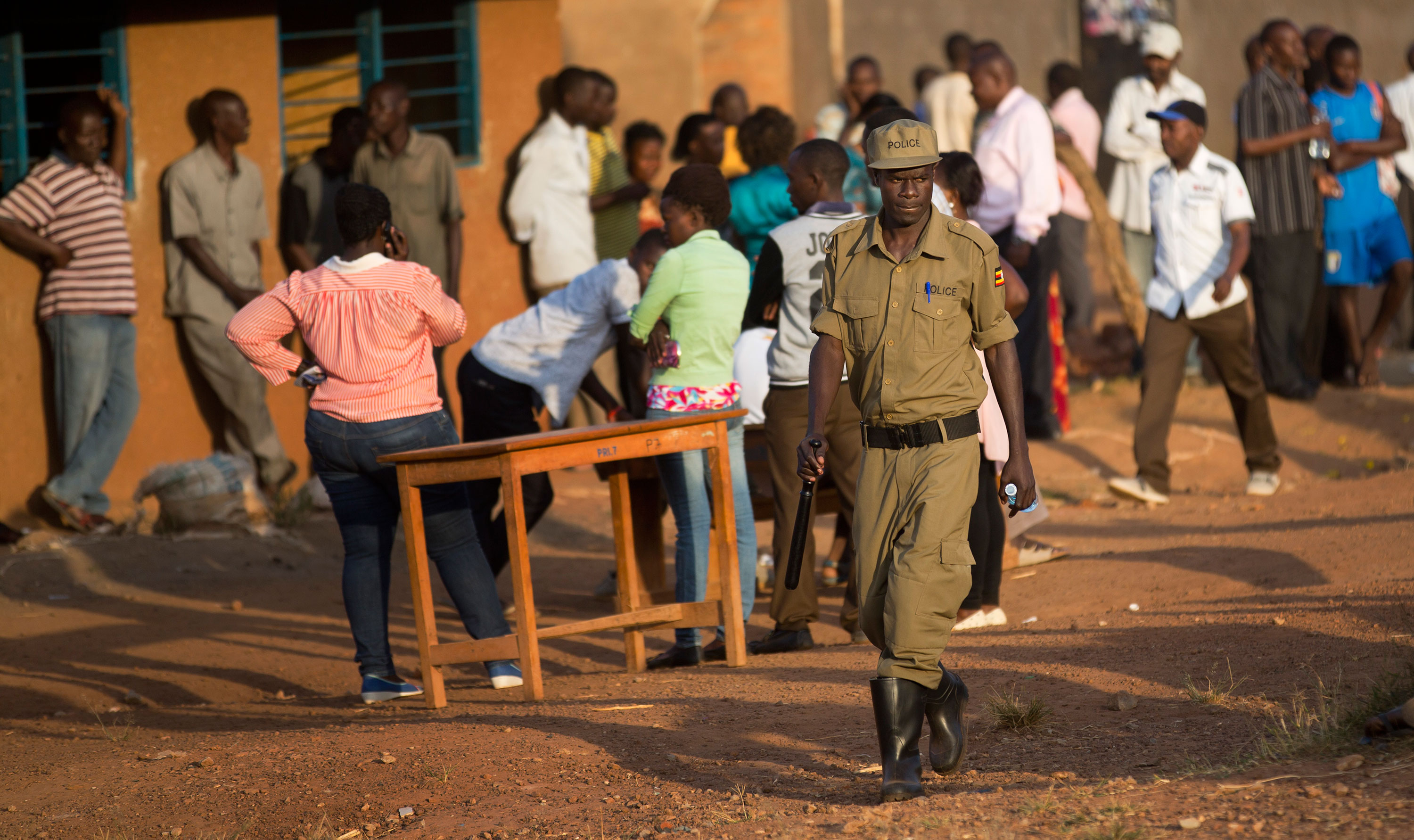
On the eve of presidential elections, a heavy police and military presence can be seen in the capital Kampala: photo by Ben Curtis/AP, 18 February 2016
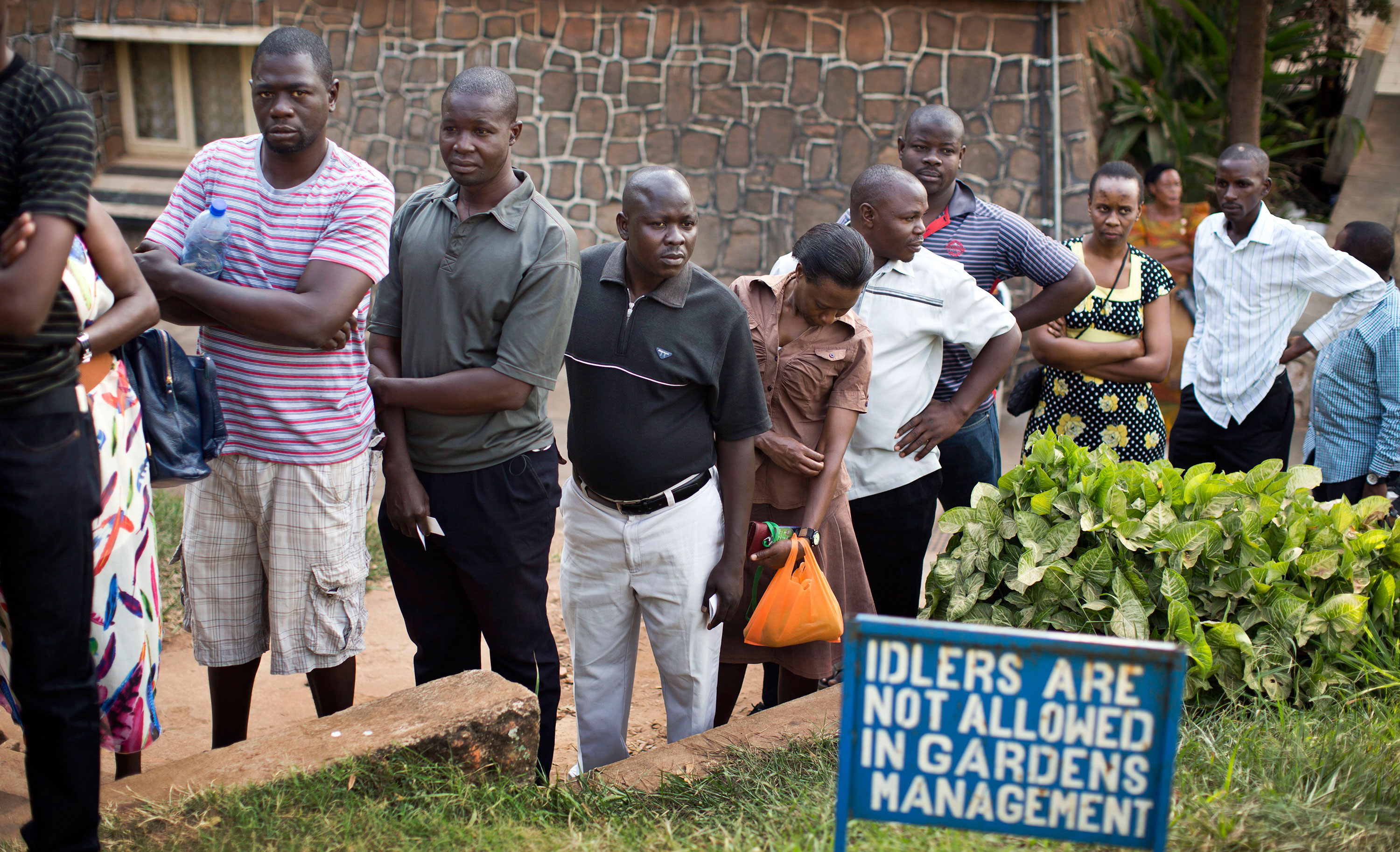

Voters queue at the National Theatre polling station,
one of the few in the capital which two hours after voting was due to
start had received ballot boxes and papers, in Kampala: photo by Ben Curtis/AP, 18 February 2016
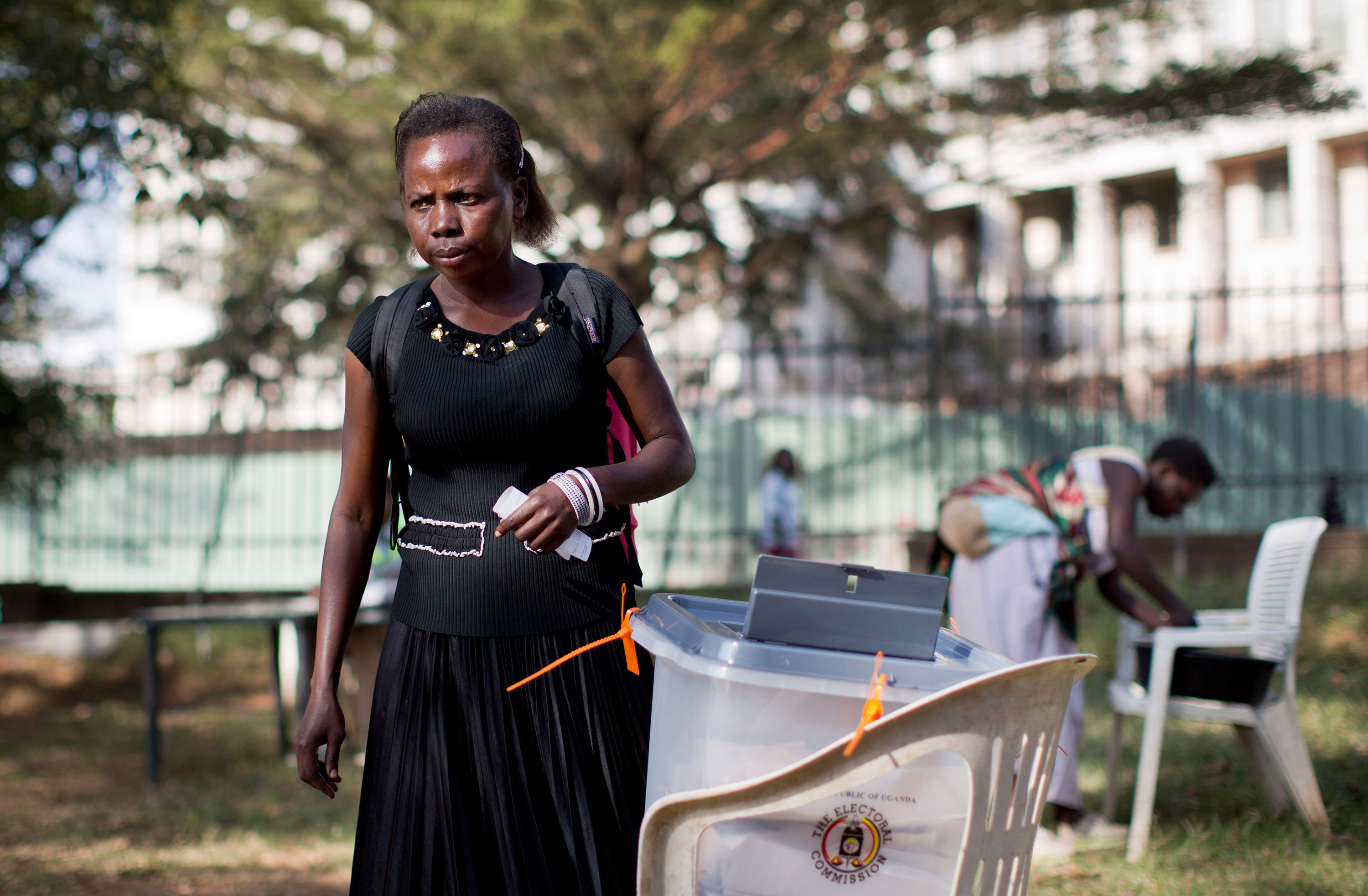
A woman casts her vote at the National Theatre polling station: photo by Ben Curtis/AP, 18 February 2016

A woman casts her vote at the National Theatre polling station: photo by Ben Curtis/AP, 18 February 2016

Post electoral violence in #Uganda. 5 civilians and one policeman dead. #UgandaElections: image via President Vusani @Vusani. 19 February 2016
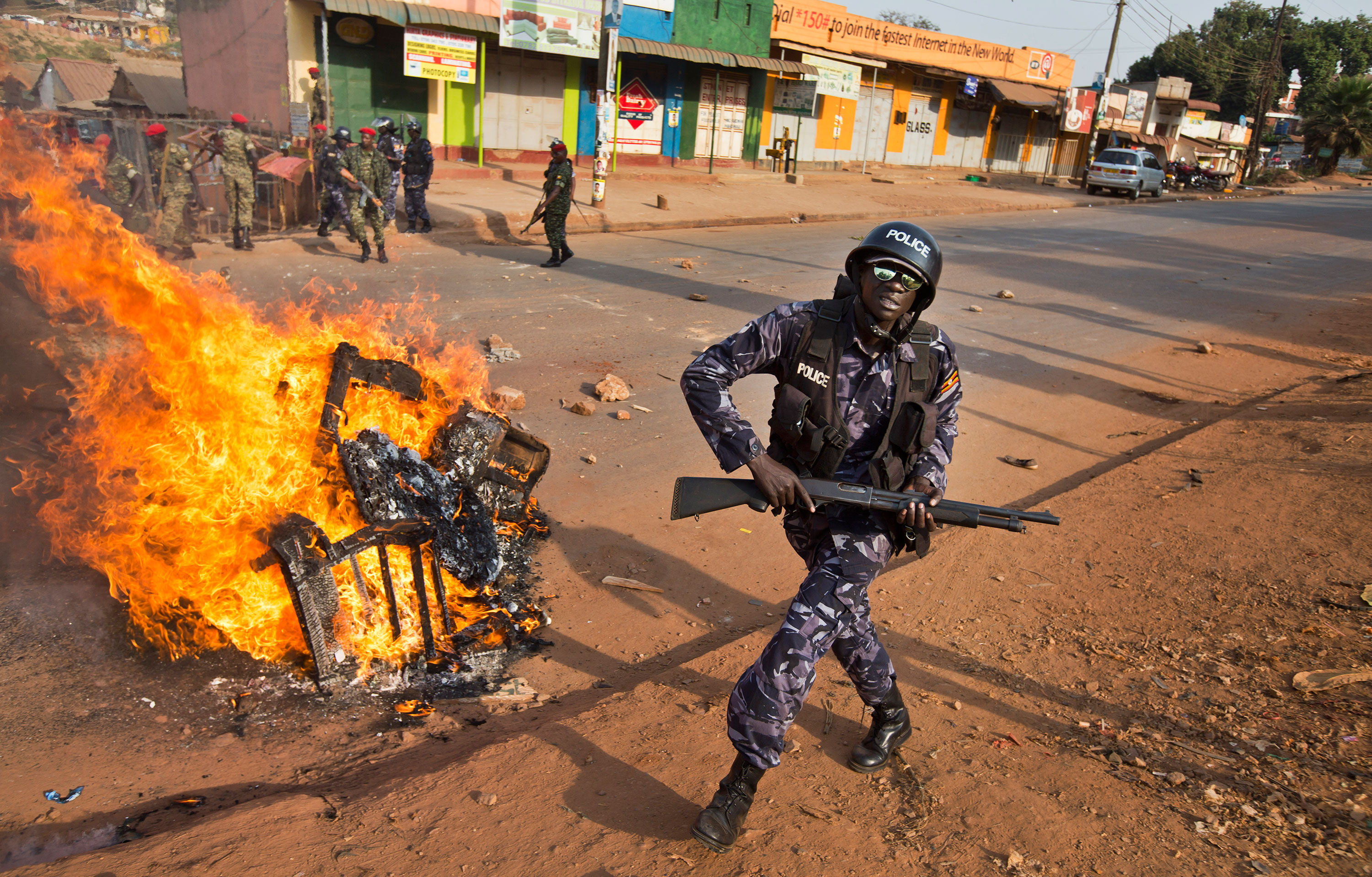
At least one person was killed in Uganda's capital Kampala on Monday in the worst outbreak of violence yet during campaigning for the forthcoming presidential election on February 18. Police spokesman Fred Enanga confirmed on Tuesday that one civilian was killed in the scuffles and that police fired tear gas and rubber bullets to disperse supporters of presidential candidate Kizza Besigye.: photo by Ben Curtis/AP, 16 February 2016

Opposition supporters gesture in front of policemen in the capital Kampala: photo by Goran Tomasevic/Reuters, 16 February 2016

Uganda riot policemen pass by an injured protester during clashes in Kampala: photo by Goran Tomasevic/Reuters, 16 February 2016

The outbreak of violence came just three days before
presidential and parliamentary elections due to take place on
February 18: photo by Goran Tomasevic/Reuters, 16 February 2016

A journalist runs in front of riot police in Kampala: photo by Goran Tomasevic/Reuters, 16 February 2016
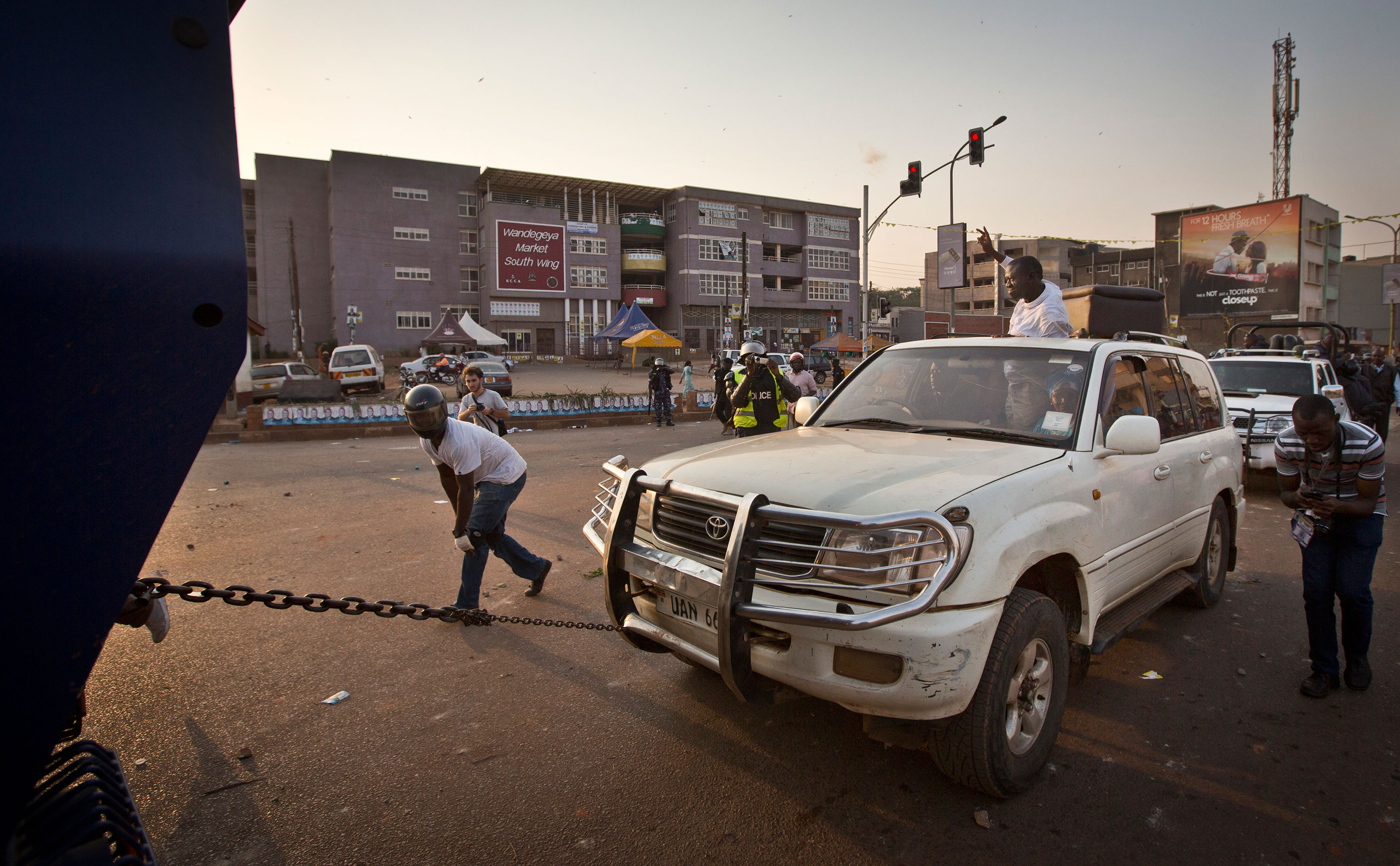
Opposition leader Kizza Besigye flashes the victory
sign from his vehicle, as it is towed away by an armoured personnel
carrier after he was prevented by police from reaching one of his
campaign rallies, near to Makerere University in Kampala, Uganda: photo by Ben Curtis/AP, 16 February 2016

A female opposition supporter screams in pain in Kampala. photo by Goran Tomasevic/Reuters, 16 February 2016

Residents hide behind a metal shop security grille as outside riot police chase angry opposition supporters: photo by Ben Curtis/AP, 16 February 2016

The country is using a new biometric system to verify
voters, but tests for the system only began in recent weeks, leaving
little time to train staff at polling stations nationwide: photo by Goran Tomasevic/Reuters, 16 February 2016

Masses dispersed as deployed police battle it out with FDC supporters #UgandaDecides: image via NTV UGANDA @ntvuganda, 19 February 2016

Police and army seal off Mbabazi's home #UgandaDecides: image via Daily Monitor @DailyMonitor, 19 February 2016

EARLIER: Police officers walk into the FDC HQ to order FDC party officials out. #UgandaDecides: image via NTV UGANDA @ntvuganda, 19 February 2016

EARLIER: Police officers walk into the FDC HQ to order FDC party officials out. #UgandaDecides: image via NTV UGANDA @ntvuganda, 19 February 2016

EARLIER: Police officers walk into the FDC HQ to order FDC party officials out. #UgandaDecides: image via NTV UGANDA @ntvuganda, 19 February 2016

EARLIER: Police officers walk into the FDC HQ to order FDC party officials out. #UgandaDecides: image via NTV UGANDA @ntvuganda, 19 February 2016

Arrested. Again.#UgandaDecides: image via AJE News @AJENews 19 February 2016

#UgandaDecides FDC Flag bearer Dr Besigye 2 hold a press conference immediately aftr his release frm Nagalama police: image via Sudhir Byaruhunga @Sudhimtv, 19 February 2016

Uganda police is spraying teargas into the offices here at our headquarters. #UgandaDecides: image via FDC Official #FDCOfficial1, 19 February 2016

.Ugandan Forces Crack Down on Protesters Amid Vote Counting #UgandaDecides: image via Hot Beak World @HotBeakWorld, 19 February 2016

#Uganda's only female presidential candidate. #UgandaDecides: image via BBC Africa @BBCAfrica, 18 February 2016

#Uganda police statement explaining 'arrest' of opposition candidate @kizzabesigye1 on election day #UgandaDecides: image via Rachael Akidi @rakidi, 28 February 2016

#Uganda : Ggabba, voting station closed without anybody voted yet. Police arresting protesters: image via simone schlindwein @schlindweinsim, 19 February 2016

#Uganda : Ggabba, total Chaos, thousands of ppl shouting, I ve covered 6elections in 8yrs+never seen chaos like that: image via simone schlindwein @schlindweinsim, 19 February 2016

Post electoral violence in #Uganda. 5 civilians and one policeman dead. #UgandaElections: image via President Vusani @Vusani. 19 February 2016

Post electoral violence in #Uganda. 5 civilians and one policeman dead. #UgandaElections: image via President Vusani @Vusani. 19 February 2016
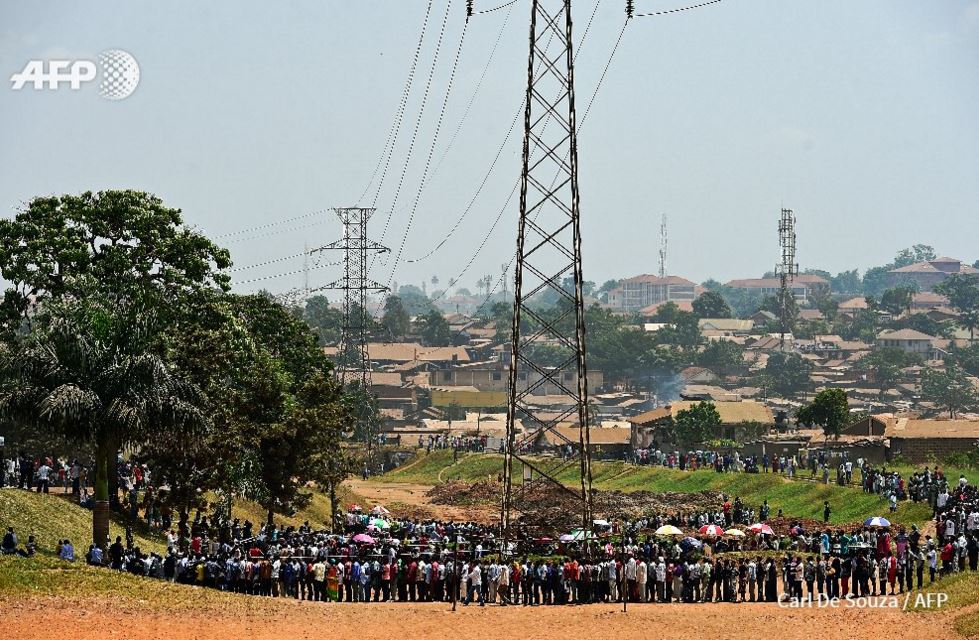
Voting delays in Uganda as Museveni eyes fifth term: image via AFP news agency @AFP, 18 February 2016

#UPDATE Uganda police fire tear gas at voters angered by delays: image via AFP news agency @AFP, 18 February 2016

#UPDATE Uganda poll delays 'inexcusable': Commonwealth observer chief: image via AFP news agency @AFP, 18 February 2016

Ugandan president Yoweri Musageni, who has been in power for 30 years, arrives with his wife, Janet, at a campaign rally in Kampala: photo by
Dai Kurokawa/European Pressphoto Agency, 18 February 2016


The leading opposition figure is a former army doctor, Kizza Besigye, who is now making his fourth bid for president: photo by
Dai Kurokawa/European Pressphoto Agency, 18 February 2016

Karamojong tribesmen in colourful hats traveling near the town of Kaabong, Uganda: photo by Goran Tomasevic/Reuters, 17 February 2015

A Karamojong tribesman in a colourful hat traveling near the town of Kaabong, Uganda: photo by Goran Tomasevic/Reuters, 17 February 2015

A voter stretches her arms as she waits in line to cast her ballot with other Ugandans in Kampala, the capital, on an election day marred by the arrest of a top opposition leader and the late delivery of voting materials: photo by Ben Curtis/Associated Press, 18 February 2016

Voters wait in line to cast their ballots in Kampala, the Ugandan capital, on an election day marred by the arrest of a top opposition leader and the late delivery of voting materials: photo by Ben Curtis/Associated Press, 18 February 2016

#Uganda - police officer sat on MP Nabilah Sempala during arrest of opposition leader Besigye Via @chapter4uganda: image via Samira Sawiani @samirasawiani, 15 February 2016

Bodyguards piled on top of Kizza Besigye, the opposition leader, as the riot police fired tear gas in Kampala, Uganda, on Monday: photo by Ben Curtis/Associated Press, 15 February 2016

Bodyguards piled on top of Kizza Besigye, the opposition leader, as the
riot police fired tear gas in Kampala, Uganda, on Monday: photo by
Ben Curtis/Associated Press, 15 February 2016
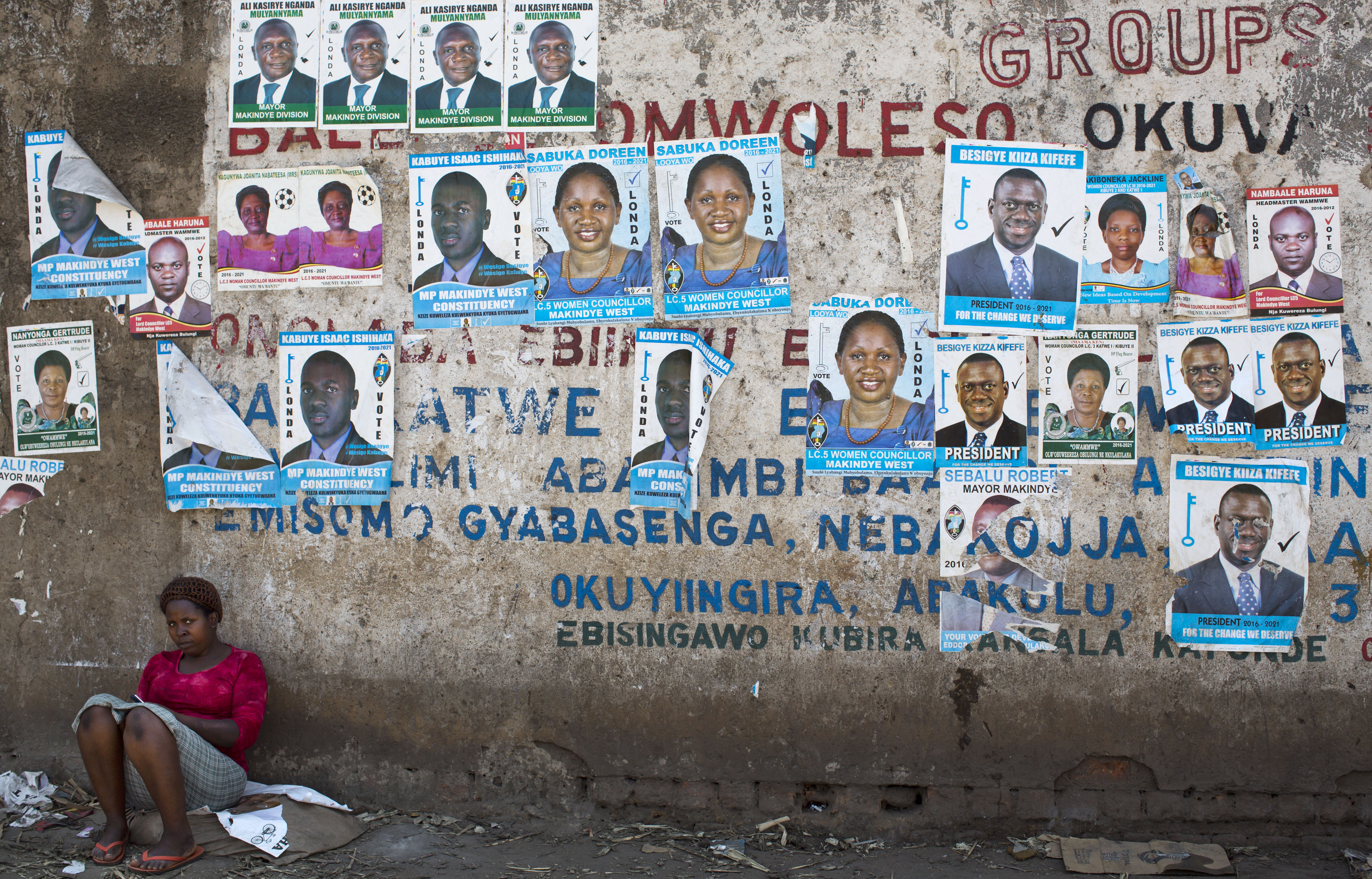
A woman sits against a wall plastered with campaign posters for opposition leader Kizza Besigye, as well as for local members of Parliament, in Kampala, Uganda. On the eve of presidential elections, a heavy police and military presence could be seen in the capital Kampala.: photo by Ben Curtis/AP, 17 February 2016

A woman sits against a wall plastered with campaign posters for opposition leader Kizza Besigye, as well as for local members of Parliament, in Kampala, Uganda. On the eve of presidential elections, a heavy police and military presence could be seen in the capital Kampala.: photo by Ben Curtis/AP, 17 February 2016

Tear gas and scuffles as Ugandan presidential challenger Kizza Besigye held by police @AFP: image via AFP Africa @AFPAfrica, 15 February 2016
Supporters of leading opposition leader and presidential candidate
Kizza Besigye cower in a shop doorway after riot police fired tear gas
at them and Besigye when they attempted to walk along a street in
downtown Kampala, Uganda: photo by Ben Curtis/AP, 15 February 2016
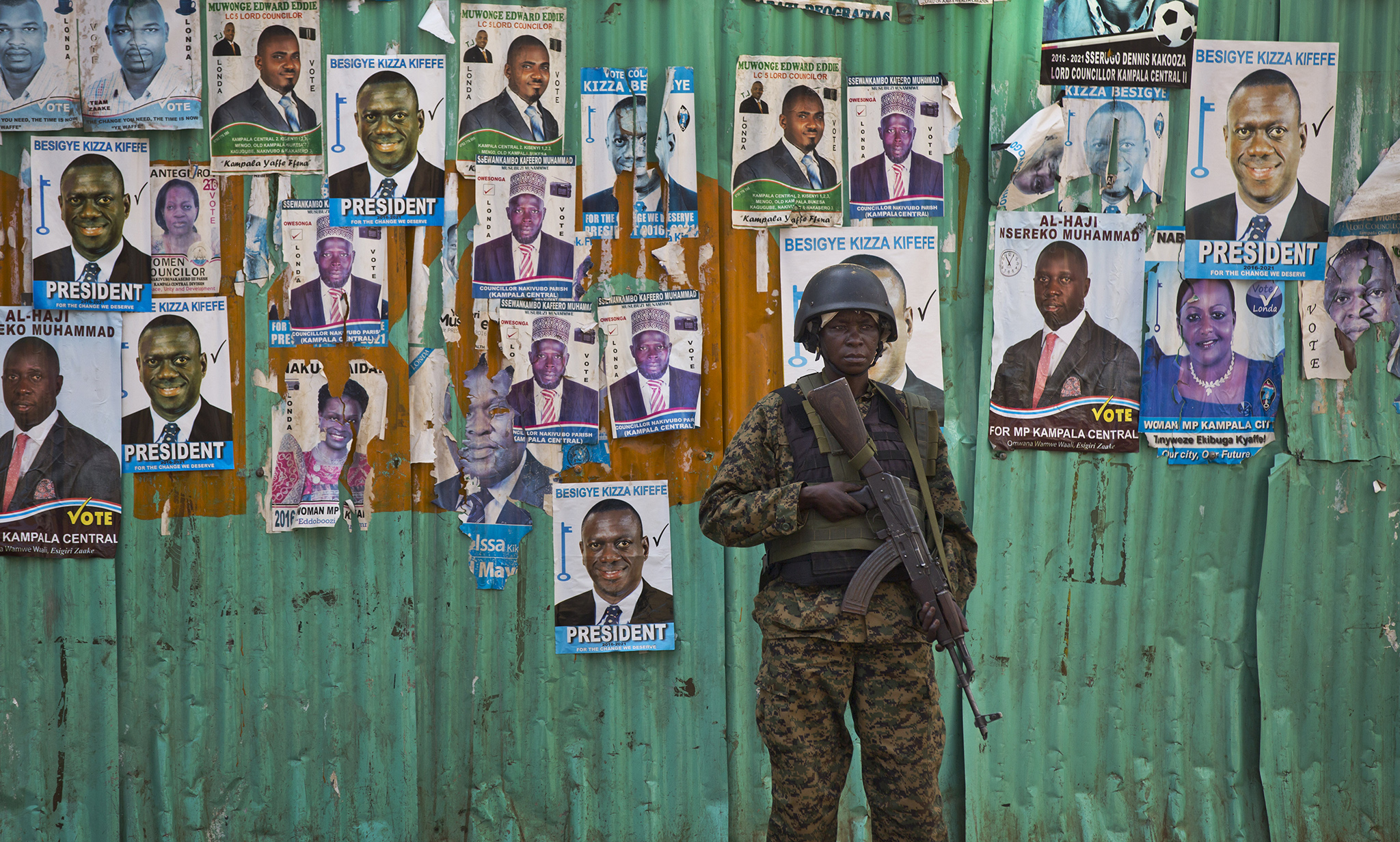
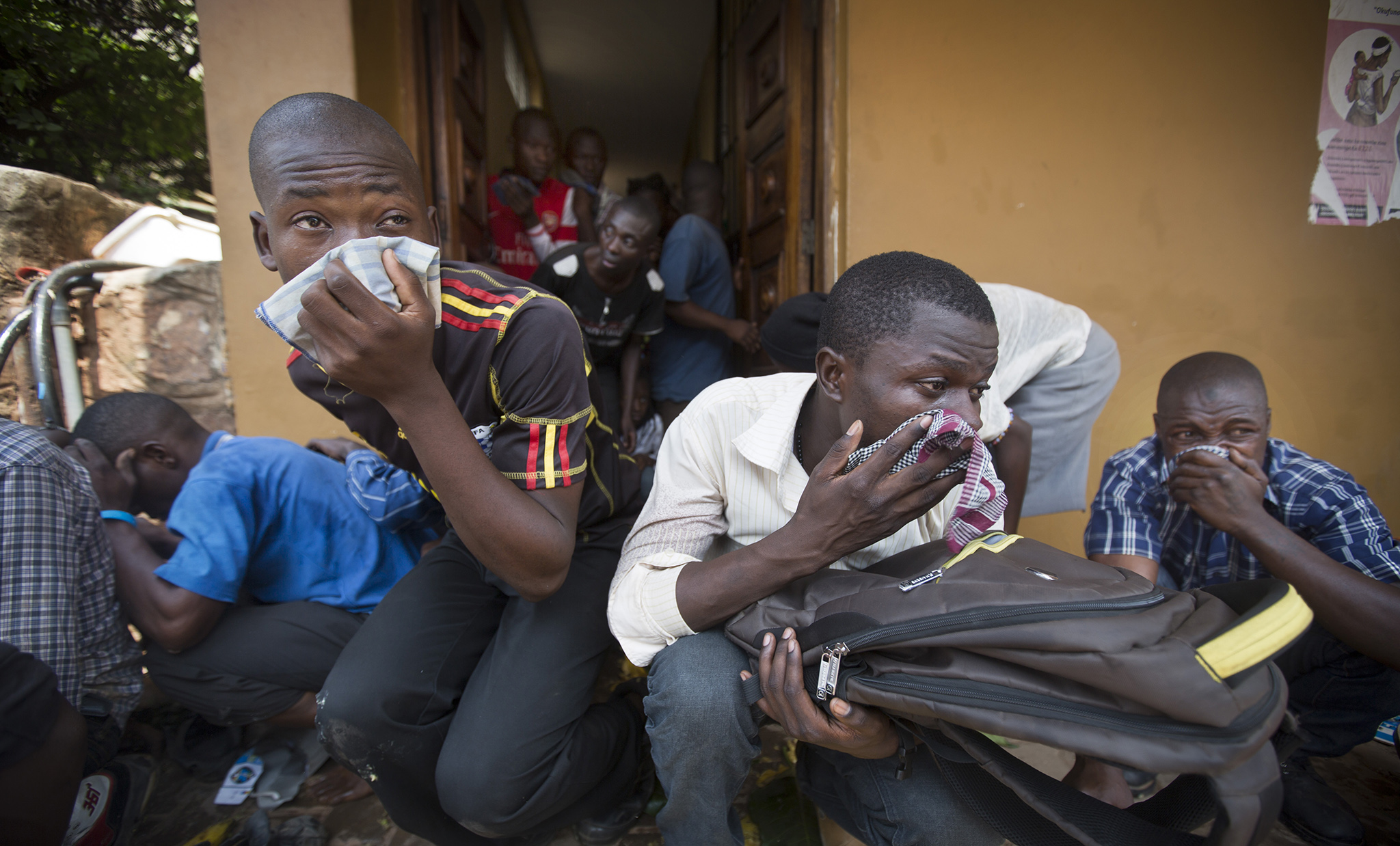
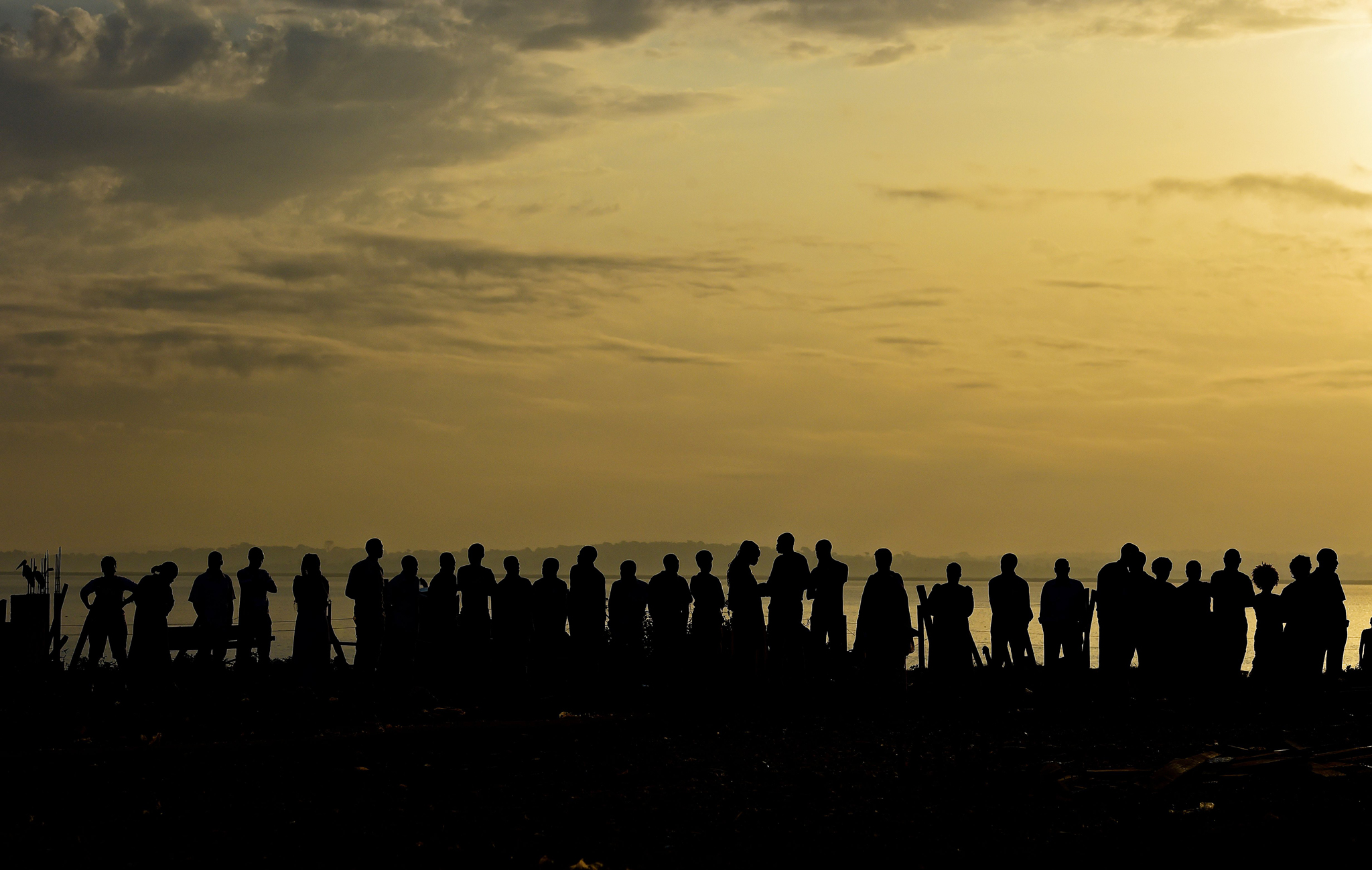




4 comments:
I am always so struck by how Ceravolo's poems perfectly capture your photo essays. One of my best decisions was to purchase the volume of his collected poems when it was published.
Maureen, thanks very much. There are qualities of humanity, expressiveness and compassion in Joe's poems that allow them to converse well outside the range of any particular coterie with the experience of people in general, or so I've found.
For an informed perspective on the state of politics in Uganda, by the by, a piece published on Wednesday, during the chaotic run-up to the predictably chaotic elections:
#UgandaDecides: How Museveni survived, grabbed donors by the balls, and became the very thing he warned against: In the 18 February election, President Yoweri Museveni will almost certainly extend his rule and will probably keep extending it until he dies in office: Richard Dowden, African Arguments, 17 February 2016
If Shakespeare were alive today, he would probably be writing plays about African presidents rather than medieval kings. Nowhere else in the world has such dramatic and personal politics. Uganda is a case in point.
In this East African nation, the re-election of President Yoweri Museveni on 18 February has always been a foregone conclusion. Having ruled for 30 years now, he will almost certainly extend his rule after the election tomorrow and probably keep extending it until he dies in office.
Victory was ensured when his two main rivals and former associates – Amama Mbabazi and Kizza Besigye – would not unite. But even if a single opposition candidate had emerged and won a majority, the election would be annulled or a quick “recount” would reverse the results.
In the early days, Museveni did not mind criticism and discussion; he was sharp enough to debate and defend his rule. But today, anyone who gets close to challenging him gets beaten up, jailed or both. Museveni has become the stereotypical African dictator that he once denounced.
I will declare an interest here. I lived in Uganda as a teacher in the first two years of Idi Amin’s rule. And I went back as a journalist after General Tito Okello took power in 1985, when I managed to visit Museveni’s fighters in the bush. I was in Kampala the following year just as his fighters took power, and I was in the front row a few days later when Museveni was sworn in as president. I interviewed the new president several times and found him an impressive debater.
After the Amin years and the subsequent political chaos, Museveni was a model of sense and stability. He opened up debate and tried to create a layered national structure for discussion and decision-making from the village to parliament. But it was only later that I realised this was only in the south. In the north, especially Acholiland where the previous regime’s leaders had come from, it was a different story. Chiefs and leaders were arrested and disappeared, and the Acholi’s precious cattle were stolen by soldiers. The region has never fully recovered.
In these early years, I saw Museveni frequently. He liked to call journalists together and debate with us. It was like bowling against a first rate batsman. He dealt with our questions thoughtfully and wittily. And in Uganda more broadly, there was open debate about policy and the presidential succession.
But the longer Museveni has ruled, the more dictatorial and remote he has become. He has reverted to crude practices such as distributing bags of money to buy votes, while his former comrades have abandoned him. The best went first, and he is now just left with servants rather than comrades.
[Richard Dowden continues:]
One of Museveni’s most loyal former followers was his childhood sweetheart, Winnie Byanyima. Her father, Boniface Byanyima, was headmaster of Mbarara High School, one of the best in the country, when the young Museveni came to beg for a place. Her father gave the young boy from a poor family a spot and even let him stay in his house during term time.
Winnie, 14 years younger, became close to the house guest. And several years later, she was one of the first to join Museveni’s movement and join him the bush. The two formed a close relationship, and at his inauguration, Winnie was standing just metres behind him sporting her battledress and huge afro.
After Museveni became president, she soon moved into State House too, until Museveni’s wife Janet came back from Sweden where she had lived for many years. Winnie was evicted.
Shortly after, Winnie married Museveni’s close friend, personal physician and one of the “originals” who had formed the National Resistance Army in 1981: Kizza Besigye.
The political struggle between Besigye and Musevevi today is thus personal as well as political. That’s why his supporters get extra beatings from the police and Musveni’s gangs of thugs.
Former Prime Minister Mbabazi is different. Museveni previously allowed discussion of successors, but more recently, anyone who has hinted Museveni has overstayed , that it’s time for change, or made a bid for power, has have been side-lined, sacked from government or threatened. They usually return to Museveni’s camp and keep a low profile.
Nevertheless, Mbabazi seemed to be quietly marked out as a likely successor. He was Musveni’s loyal servant, smart and hard-working, but always looked like a gofer rather than a potential boss. When Mbabazi realised he was being strung along, he left and ran on his own platform.
Although the election will likely be about personalities, cash payments and lost ballot boxes, Uganda’s economy will also be an important factor. The economy grew at an average 7% in the 1990s and 2000s, but has now slowed to closer to 5%. Museveni had hoped the discovery of oil would be transformative but with oil prices low, the whole project is on hold.
However, Museveni does still have Western donors by the balls – donors who donate hundreds of millions to the country. Museveni’s single most powerful tool for gouging these donors is his army. By sending troops into the likes of Somalia, South Sudan and Central African Republic, he presents himself as the region’s peacekeeper. He knows that almost no European countries are willing to send troops to these places and that no other African country has the capacity to quickly step in. Furthermore, it is well understood that Museveni’s “peacekeepers” can also be war makers. In South Sudan – contrary to UN agreements – he has sent troops to support only one side. And with a single phone call, Museveni could withdraw from any of these countries and leave chaos behind – or even ensure it.
In 1986, Museveni wrote: “The problem of Africa in general and Uganda in particular is not the people but leaders who want to overstay in power”. 30 years later, Museveni has become the very intractable, narrow-minded, authoritarian leader against which he warned.
__
(Richard Dowden, author of the opinion piece from African Arguments just given, is a British journalist who has specialised in African issues. He first went to Africa in 1971 and worked as a volunteer teacher in a rural part of Uganda, until the end of 1972, when he left the country because of Idi Amin's dictatorship. Since 1975, he has worked for several British media, serving as Africa editor for The Independent and The Economist, and for the past eight years he has been the Executive Director of the Royal African Society. He is the author of a number of books on Africa, including Africa: Altered States, Ordinary Miracles [Portobello Books, 2008], which has a foreword by the Nigerian writer Chinua Achebe ["Africa is a vast continent, a continent of people... In Africa: Altered States, Ordinary Miracles, it is clear that Richard Dowden understands this, and one could not ask for a more qualified author to explore Africa's complexity."])
Post a Comment